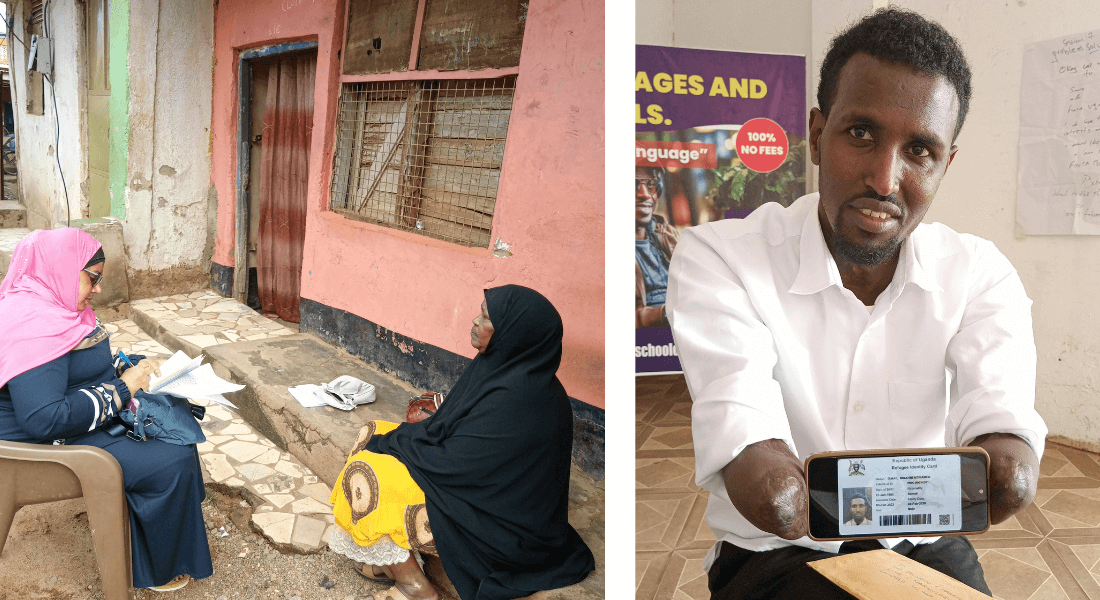Master Thesis Presentation: Nageeba Hassan Tegulwa
Nageeba Hassan Tegulwa, CERTIZENS member and recent master's graduate at the Department of Religion & Peace Studies, Makerere University, presents her thesis on 'Refugee Identity Card and Its Impact on the Somali Refugee's Personal Security'.

Refugee Identity Card and Its Impact on the Somali Refugee's Personal Security
What is your research question and where and how did you go about doing your research?
My research focuses on the experiences of Somali refugees in Uganda with a refugee card and how the card influences their access to services and personal security.
The fieldwork for this research was carried out in Kisenyi I and Kisenyi II suburbs in Kampala. The area was selected because it hosts a large section of urban Somali refugees in Uganda. Somali refugees are not treated like other refugees because they are commonly and stereotypically linked to rebel Islamic groups such as Al-shabab. In March 2023 the Office of the Prime Minister (OPM) indefinitely suspended receiving and registering Somalis after a directive from the Minister of Disaster Preparedness and Refugees. This followed a sudden influx of new arrivals suspected to be Kenyans according to documents they used at the borders, and was justified on the rounds of national security. This is one of the reasons why many Somali refugees in Uganda live without a refugee card, however not only new arrivals have been affected. Those mid-way in the asylum-refugee application and attestation process have also been affected.
I used semi-structured in-depth interviews with Somali refugees with a refugee card and Somalis without proof of identification to capture the range of experiences on how they navigate their everyday lives in Uganda. Written sources about Somali refugees and the refugee card were also used to supplement the interview data.
What were your key findings and why do they matter?
The study established that the refugee card cultivates trust and confidence, makes Somali refugees feel respected, and guarantees them various forms of freedom such as free movement, association and access to services. However, the success of the refugee card in enabling Somali refugees to access services and personal security is dependent on other social and political factors. This includes the general security situation in Kampala, the attitude of the local host community, willingness of private institutions to follow government policies, and the degree of refugee inclusion towards public benefits.
Prior to being formally recognized as a refugee, as an asylum seeker waiting for such verification, one does have some protections and access to some services in principle. However, this research also established that just as with Somalis without the refugee card, even those officially-recognised Somali refugees with refugee cards sometimes have to negotiate or find alternative modes of access to public services. For example, this might entail asking someone with a national ID to stand-in for them in certain transactions (banking or renting property or reporting theft to the police), or paying bribes where necessary.
In addition, the refugee card does not fully guarantee Somali refugees personal security. Anyone, whether a refugee or a Ugandan national, can be a victim of insecurity in Kisenyi, which is a large informal settlement. In some cases, Somali elders have negotiated for unregistered people to be given the village identity card so they are recognized in the area as they wait for a decision on their status from the OPM. However, being undocumented and officially unrecognized creates great vulnerability, and Somalis without a refugee card especially live in fear and isolation. Some say that their lives in Uganda are more or less the same as that in Somalia because of the level of insecurity associated with their lack of identification documents.
Why is your research relevant for the broader discussion on IDs and citizenship in Africa?
This research highlights the significance of formal identity cards (within official identification systems) in solving both local and global challenges related to the refugee crisis. In this case, the research reveals that formally recognized identity cards such as the refugee card are a tool of for supporting vulnerable groups such as refugees by cultivating trust and confidence and granting them freedom to move and associate with others. The research informs policy makers that for identification systems to successfully meet the intended goals, the lived realities and vulnerabilities of refugee populations need to be carefully considered.
To access the full thesis, please contact the author via nageebahassan1@gmail.com or nageebategulwa@gmail.com.
